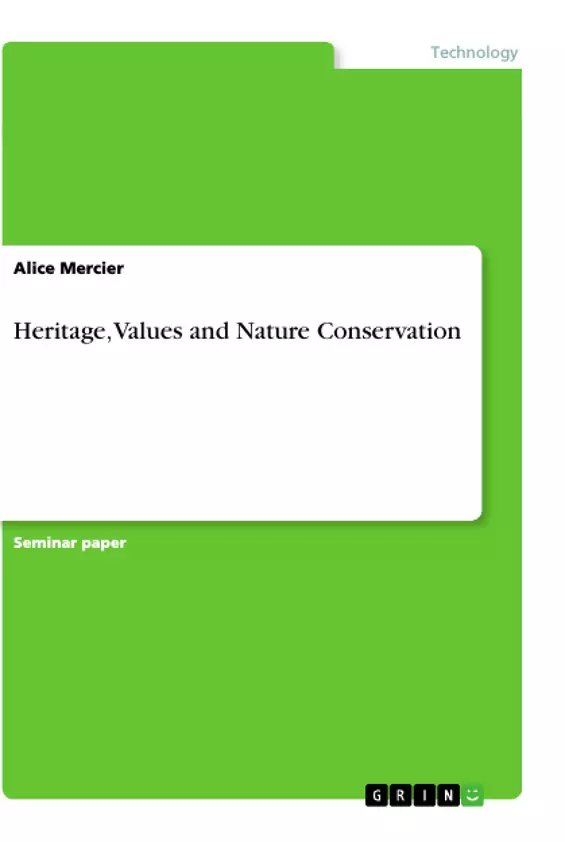This paper deals with the values, perspectives and objectives in nature conservation and recreation. In 1987, the Brundtland Commission published the ground-breaking report titled: "Our common future". The paradigm was shifted to sustainability, confronting the humanity with its responsibility to establish a development that 'meets the needs of the present without compromising the ability of future generations to meet their own needs'.
There is hardly any realm untouched by the notion of sustainable development, be it of cultural, environmental, social or political nature. Simplistically it can be stated that we aim at passing on our legacy with minimal losses. This goal was not generated in 1987, but rather is an inherited desire to every human being. There is consensus that cultural and biological diversity is a great part of this heritage, and that globalization and consequent homogenization is jeopardizing it.
Inhaltsverzeichnis (Table of Contents)
- Values & Perspectives
- Objectives
- Values in Nature Conservation & Recreation
Zielsetzung und Themenschwerpunkte (Objectives and Key Themes)
This work aims to explore the complex relationship between cultural values, environmental conservation, and nature-based recreation. It examines how different perspectives and values influence the understanding and implementation of sustainable development, particularly within the context of protected areas. The text emphasizes the importance of recognizing and integrating diverse cultural perspectives in conservation efforts to achieve balanced and effective outcomes.
- The importance of sustainable development and the intergenerational equity it promotes.
- The diverse values and perspectives surrounding nature conservation and recreation.
- The need for cross-cultural understanding and collaboration in achieving effective conservation outcomes.
- The impact of globalized conservation paradigms on local practices and values.
- The potential for conflicts of interest between tourism, local resource use, and conservation needs.
Zusammenfassung der Kapitel (Chapter Summaries)
-
Values & Perspectives
This chapter delves into the diverse values that shape our understanding and interaction with the environment. It explores how cultural, social, and individual perspectives influence the perception of appropriate conservation strategies. The chapter introduces a range of cross-cultural values that underpin a sustainable and conservation-oriented ethic, highlighting the importance of social justice, respect for biodiversity, and cultural heritage in achieving balanced environmental management. -
Objectives
This chapter examines the multifaceted objectives that drive different stakeholders involved in nature conservation. It highlights the diverse goals, expectations, and needs of individuals, communities, and organizations in their relationship with the natural environment. The chapter explores the concept of Ecosystem Services, outlining the various ways in which nature provides benefits to human well-being and emphasizes the need for a holistic approach to conservation that recognizes the interconnectedness of these services. -
Values in Nature Conservation & Recreation
This chapter delves into the growing field of nature-based recreation and its implications for conservation. It examines the potential conflicts and synergies between these two seemingly compatible goals. The chapter explores the challenges and opportunities associated with managing the increasing human pressure on protected areas, particularly in the context of globalization and the need to balance local needs with global conservation goals.
Schlüsselwörter (Keywords)
This work explores the interconnectedness of values, perspectives, and practices in nature conservation. Key keywords include: sustainable development, cultural diversity, biodiversity, ecosystem services, protected areas, nature-based recreation, cross-cultural understanding, local knowledge, and global conservation frameworks.
Frequently Asked Questions: Heritage, Values and Nature Conservation
What is the paradigm shift mentioned in "Our Common Future"?
The 1987 Brundtland report shifted the focus to sustainable development, emphasizing humanity's responsibility to meet present needs without compromising future generations.
How do cultural values influence nature conservation?
Different cultures have diverse perspectives on the environment. Recognizing these values is crucial for achieving balanced and effective conservation outcomes in protected areas.
What are Ecosystem Services?
Ecosystem Services are the various benefits that nature provides to human well-being, such as clean water, pollination, and recreational opportunities.
What conflicts can arise in nature-based recreation?
Conflicts often occur between the needs of tourism, local resource use by communities, and the overarching goals of environmental protection.
Why is cross-cultural understanding important for conservation?
It allows for better collaboration and ensures that global conservation frameworks respect local knowledge and cultural diversity.
What is the impact of globalization on local conservation?
Globalization can lead to homogenization, potentially jeopardizing biological and cultural diversity by imposing external conservation paradigms on local practices.
- Quote paper
- Alice Mercier (Author), 2010, Heritage, Values and Nature Conservation, Munich, GRIN Verlag, https://www.hausarbeiten.de/document/914044


